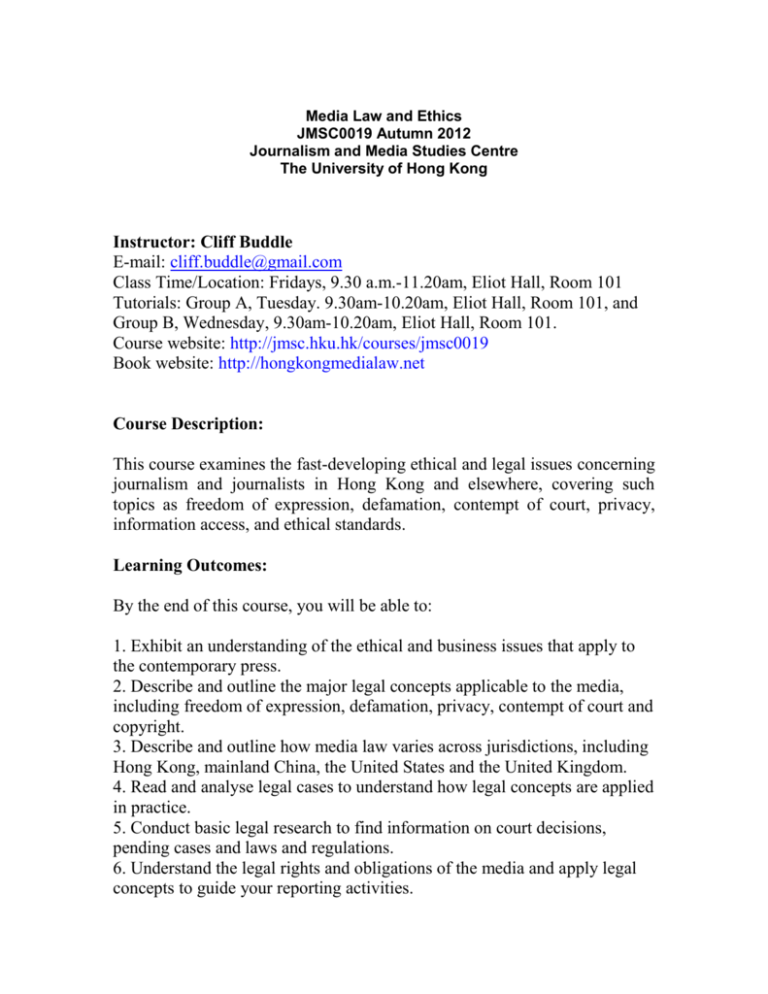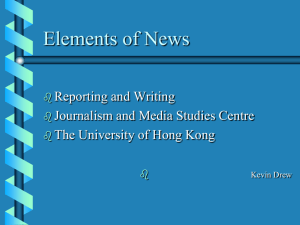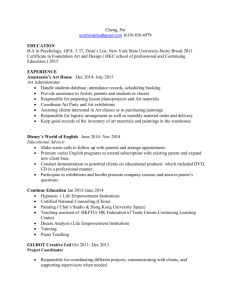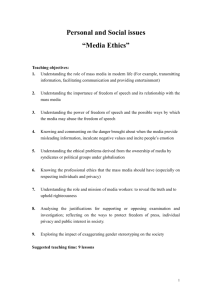Media Law and Ethics - Journalism and Media Studies Centre
advertisement

Media Law and Ethics JMSC0019 Autumn 2012 Journalism and Media Studies Centre The University of Hong Kong Instructor: Cliff Buddle E-mail: cliff.buddle@gmail.com Class Time/Location: Fridays, 9.30 a.m.-11.20am, Eliot Hall, Room 101 Tutorials: Group A, Tuesday. 9.30am-10.20am, Eliot Hall, Room 101, and Group B, Wednesday, 9.30am-10.20am, Eliot Hall, Room 101. Course website: http://jmsc.hku.hk/courses/jmsc0019 Book website: http://hongkongmedialaw.net Course Description: This course examines the fast-developing ethical and legal issues concerning journalism and journalists in Hong Kong and elsewhere, covering such topics as freedom of expression, defamation, contempt of court, privacy, information access, and ethical standards. Learning Outcomes: By the end of this course, you will be able to: 1. Exhibit an understanding of the ethical and business issues that apply to the contemporary press. 2. Describe and outline the major legal concepts applicable to the media, including freedom of expression, defamation, privacy, contempt of court and copyright. 3. Describe and outline how media law varies across jurisdictions, including Hong Kong, mainland China, the United States and the United Kingdom. 4. Read and analyse legal cases to understand how legal concepts are applied in practice. 5. Conduct basic legal research to find information on court decisions, pending cases and laws and regulations. 6. Understand the legal rights and obligations of the media and apply legal concepts to guide your reporting activities. 7. Understand the role and functioning of courts and gain familiarity with reporting on legal issues and court cases. Structure, Format and Readings: Classes will be held 9.30 a.m. to 11.20am on Fridays beginning Sept. 21, 2012 You also are required to attend a weekly tutorial beginning Sept. 25 on Tuesdays (for Group A) and Wednesdays (for Group B). This will be held between 9.30am-10.20am. The tutorial will allow us to discuss course materials in greater depth and to present research projects. There is one required textbook, Hong Kong Media Law: A Guide to Journalists and Media Professionals (HKU Press 2007), available at the university bookstore. Students will be required to read selected chapters. Also, throughout the semester, other readings will be distributed or posted on the course website as required or recommended readings. In addition to assigned readings, students are expected to read daily newspapers and review other media outlets such as the Internet and television to keep abreast of current media law and ethics developments and cases. Students are expected to make a presentation, in teams of two, of research on a current media law and/or ethics topic approved in advance by the instructor. During the semester there will be a mid-term quiz. At the conclusion of the semester, students will have a written, take-home exam. The exam will be distributed at the last class on December 7, 2012 and is due December 14, 2012 before 6 p.m. No late exams will be accepted. You must submit both electronic and paper versions of the exam and paper. Grading: Take-home, written exam: 40 percent Research presentation: 30 percent Midterm quiz: 20 percent Tutorial/Class participation: 10 percent Weekly Schedule: (Please check the “Readings” section of the course website for relevant materials) Week 1 September 21, 2012 Overview of Media Law and Ethics. What is media law? What are media ethics? How are these concepts integrated? What are the primary responsibilities of a journalist today? This session will introduce the course and explore some of the critical issues facing the journalism profession. Week 2 September 28, 2012 Legal Systems, Freedom of Expression and the Role of the Press. Freedom of the press and freedom of speech are protected by Hong Kong’s Basic Law and by international human rights conventions. But what do we mean by these expressions? What restrictions on these freedoms are permitted by law? How do the courts decide whether freedom of expression has been unlawfully curbed? What issues arise from the growth of the Internet as a means of expression? What are the Basic Law, common law and other key elements of the legal system? Week 3 October 5, 2012 Examining Ethical Standards: Media scandals and the question of regulation. Phone hacking, deception, trespassing, naked pictures, invasions of privacy… Journalists work in a competitive environment, under constant pressure to find exclusive material. What happens when they go too far? What are the rules governing the ethics of the profession – and who should police them? Codes of conduct and press councils play their part. But is self-regulation sufficient? How might tougher regulation pose a threat to the freedom of the press? Week 4 October 12, 2012 The Press versus the Judicial System. What are the tensions between the right to a free press and the right to a fair trial? Covering court cases and criminal investigations in Hong Kong can be like crossing a legal minefield. But a good understanding of the danger areas enables journalists to get the most out of their court and legal stories. This class examines the principle of open justice, contempt of court, and reporting restrictions. Week 5 October 19, 2012 Privacy and Obscenity. Journalists have been criticised for controversial reporting techniques, particularly those that impinge on individual privacy, including the use of hidden cameras, deception and ambush interviews. Complicating the privacy question are the often overlapping issues involving obscenity, particularly with the ease and proliferation of the online posting of private images. How do these issues affect the media when they cover such controversies as the Edison Chen case? Week 6 October 26, 201 Defamation I: How does the law seek to protect people’s reputations? What do we mean by “defamation”? What is the difference between libel and slander? Who can sue? Who can be sued? What are the implications for journalists? And how is the Internet affecting these issues? November 2. Reading Week. No Classes Week 7 November 9, 2012 Defamation II: The defences. How can journalists defend themselves when accused of publishing defamatory content? What are the defences available to them? How are “fair comment,” and “responsible reporting” defined? How might Hong Kong’s libel laws be reformed to better reflect the modern media environment? Week 8 November 16, 2012 MID TERM QUIZ New Media and the Business of Journalism. The news media worldwide have undergone huge changes in recent years as the consolidation and decline of traditional media have competed with the rise of new media players, including state-owned media and technology giants such as Google. What do these changes means in terms of impartiality and power of the media? Have pressures for profits and the rise of non-traditional media intruded into the newsgathering process? Week 9 November 23, 2012 Confidentiality: Access to Information, Official Secrets, Protecting Sources. The media face many legal issues involving confidentiality of information. When can the government legitimately invoke official secrecy or restrict boundaries of newsgathering? To what information do the public and press have aright of access? When can reporters claim confidentiality when it comes to protecting their sources? Should Hong Kong introduce a freedom of information law? Week 10 November 30, 2012 Media Law in the PRC. The regulation of media and reporters in China is a shifting landscape. How are domestic and foreign media controlled and regulated? What rules apply to foreign, domestic and Hong Kong/Macau/Taiwan journalists in China, and how are they treated differently? What is the impact of state secrets laws on the media in China? Week 11 December 7, 2012 Copyright and Intellectual Property. In the age of the Internet, intellectual property issues have become increasingly more important for both traditional and online media. What major copyright issues arise for both media companies and individual journalists? How has the increase in online publications complicated the conflict between copyright violations versus fair dealing/fair use? What are the alternatives to traditional copyright? TAKE HOME EXAM WILL BE DISTRIBUTED











